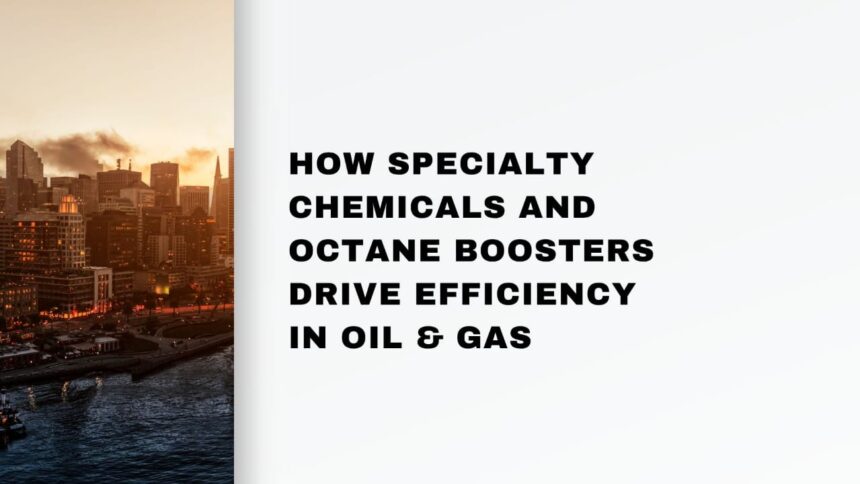Efficiency remains a constant priority in the oil and gas industry. Every process, from extraction to refining, runs under pressure – environmental, operational, and financial. Companies are expected to do more with less. Reduce emissions. Extend equipment life. Lower energy use. And still maintain quality.
That is where the right chemicals come in. Specialty formulations and octane boosters quietly hold the system together. They may not always be in the spotlight, but their impact is unmistakable. They enhance the work at the molecular level, and the entire process functions more easily. And in this business, a little smoother often means millions saved.
The Need for Efficiency in Oil & Gas
For decision-makers, efficiency is not only about faster output but also about predictability and reliability. The current state of the industry is characterized by more stringent regulations, fluctuating fuel prices, and growing pressure on sustainability. Unexpected downtimes or quality issues can quickly escalate into budget losses.
Operational efficiency has therefore become a matter of control and precision. Every barrel must justify its cost. Every batch must meet compliance. The focus has shifted toward responsible energy production — balancing profitability with sustainability. The role of chemicals in the attainment of this balance is direct.
Specialty Chemicals and Their Role in Operational Performance
Specialty chemicals may seem like a minor component, but they shape performance at every stage. In drilling, they help reduce friction and fluid loss. In refining, they enhance yield and stability. In storage or transport, they maintain the product’s consistency and safety.
Their main strength lies in precision.
Every formulation has its purpose: corrosion control, flow control, separation, or stabilization. The result is smoother processing and reduced wear on infrastructure.
The use of specialty chemicals is no longer a purely technical matter but a strategic business decision. When operations run more efficiently and for longer periods, maintenance costs decrease. Equipment downtime decreases. That means more predictable production schedules. In other words, specialty chemicals quietly strengthen business reliability.
The Power of Octane Boosters
Among performance additives, octane boosters are among the most influential in directly improving fuel efficiency. They enhance the octane rating, allowing engines to compress the fuel mixture further before ignition. This results in improved combustion and cleaner power delivery.
In refining, a higher octane rating supports smoother blending and better output quality. For downstream operations, it translates to fuels that burn cleaner and perform more consistently under demanding conditions.
While octane boosters deliver significant benefits, their performance depends on factors such as fuel type, engine design, and blending ratios. But when formulated and applied right, they enhance both performance and durability. That balance — power without penalty — is what makes them valuable to modern fuel producers and distributors.
Efficiency Strategies for Modern Operations
Operational effectiveness is no longer achieved through a single step. It is built across processes. From drilling fluids that maintain stability to combustion chemicals that improve performance, every additive choice influences overall efficiency.
A good strategy focuses on three things:
- Consistency in quality: No improvement holds value if it cannot be repeated reliably.
- Compatibility with evolving regulations: Chemicals must perform without adding compliance risks.
- Integration with digital insights: Data from operations can now guide how and where additives deliver the most value.
Decision-makers increasingly recognize that chemical management is not just about sourcing but about partnership — collaborating with suppliers who understand both chemistry and operational demands.
Together, these strategies translate into measurable business outcomes across upstream, midstream, and downstream operations.
Business Impact and Industry Integration
he connection between specialty chemicals and octane boosters runs deeper than it may seem. Both contribute to one objective: controlled, optimized performance. When used together, they reduce inefficiencies across the value chain.
In the case of upstream operations, chemical additives are used to ensure the integrity of drilling. At midstream, they enhance the movement of fluids and protect assets. Octane boosters improve the quality of fuel and shelf life in the downstream. The combined effect is reflected in reduced interruptions, increased throughput, and quantifiable savings.
Sustainability is also directly related to efficiency. Lower emissions result from reduced fuel waste. Longer equipment life means fewer replacements. Consistent production means better resource utilization.
These are not side benefits, but rather business enablers that can enable companies to remain competitive in the global energy transition.
Conclusion
Efficiency in oil and gas has moved beyond speed or volume. It now means achieving stability, predictability, and cleaner performance. Specialty chemicals and octane boosters play a critical role in that shift.
They help operations perform better, not just faster. They give decision-makers greater control over variables that once seemed unpredictable — corrosion, wear, instability, and inconsistent combustion.
Although chemical performance may not be the most visible aspect of the industry, it remains one of the most influential. The companies that treat chemical performance as a strategic lever, not just a procurement item, are the ones who quietly gain the edge.
While efficiency will continue to evolve, this approach lays a strong foundation for lasting operational performance.
Author Bio
Ramesh Patel, Sales & Marketing Director at Minal Specialities, brings over 17 years of international experience with deep expertise in oil & gas chemicals and global market expansion.


